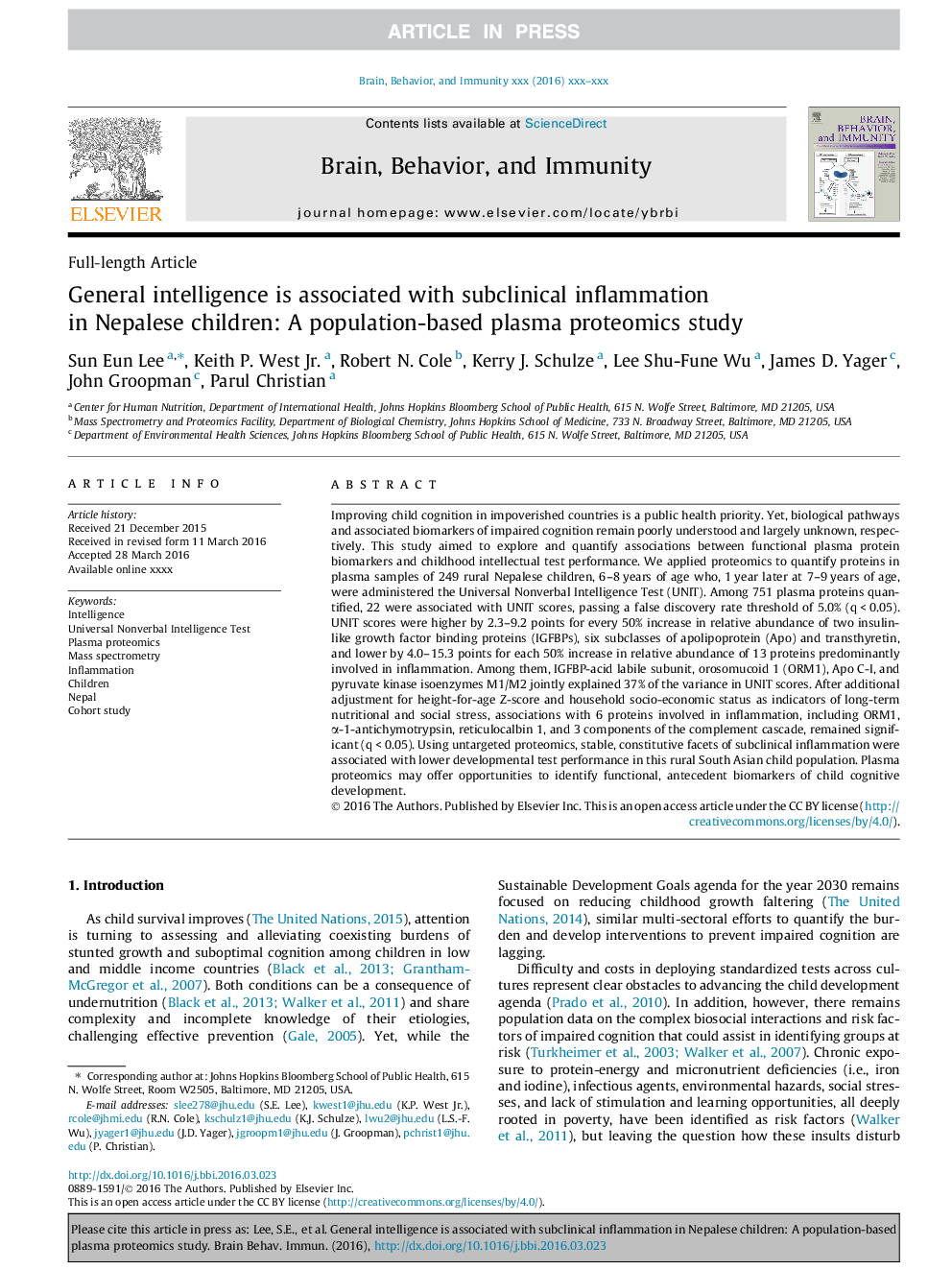| کد مقاله | کد نشریه | سال انتشار | مقاله انگلیسی | نسخه تمام متن |
|---|---|---|---|---|
| 7280415 | 1473911 | 2016 | 11 صفحه PDF | دانلود رایگان |
عنوان انگلیسی مقاله ISI
General intelligence is associated with subclinical inflammation in Nepalese children: A population-based plasma proteomics study
ترجمه فارسی عنوان
اطلاعات عمومی با التهاب زیر کلامی در کودکان نپال همراه است: مطالعه پروتویمیک پلاسمای مبتنی بر جمعیت
دانلود مقاله + سفارش ترجمه
دانلود مقاله ISI انگلیسی
رایگان برای ایرانیان
کلمات کلیدی
هوش تست هوش جهانی غیروابسته، پروتئومیک پلاسما، طیف سنجی جرمی، التهاب فرزندان، نپال، مطالعه کوهورت،
موضوعات مرتبط
علوم زیستی و بیوفناوری
ایمنی شناسی و میکروب شناسی
ایمونولوژی
چکیده انگلیسی
Improving child cognition in impoverished countries is a public health priority. Yet, biological pathways and associated biomarkers of impaired cognition remain poorly understood and largely unknown, respectively. This study aimed to explore and quantify associations between functional plasma protein biomarkers and childhood intellectual test performance. We applied proteomics to quantify proteins in plasma samples of 249 rural Nepalese children, 6-8 years of age who, 1 year later at 7-9 years of age, were administered the Universal Nonverbal Intelligence Test (UNIT). Among 751 plasma proteins quantified, 22 were associated with UNIT scores, passing a false discovery rate threshold of 5.0% (q < 0.05). UNIT scores were higher by 2.3-9.2 points for every 50% increase in relative abundance of two insulin-like growth factor binding proteins (IGFBPs), six subclasses of apolipoprotein (Apo) and transthyretin, and lower by 4.0-15.3 points for each 50% increase in relative abundance of 13 proteins predominantly involved in inflammation. Among them, IGFBP-acid labile subunit, orosomucoid 1 (ORM1), Apo C-I, and pyruvate kinase isoenzymes M1/M2 jointly explained 37% of the variance in UNIT scores. After additional adjustment for height-for-age Z-score and household socio-economic status as indicators of long-term nutritional and social stress, associations with 6 proteins involved in inflammation, including ORM1, α-1-antichymotrypsin, reticulocalbin 1, and 3 components of the complement cascade, remained significant (q < 0.05). Using untargeted proteomics, stable, constitutive facets of subclinical inflammation were associated with lower developmental test performance in this rural South Asian child population. Plasma proteomics may offer opportunities to identify functional, antecedent biomarkers of child cognitive development.
ناشر
Database: Elsevier - ScienceDirect (ساینس دایرکت)
Journal: Brain, Behavior, and Immunity - Volume 56, August 2016, Pages 253-263
Journal: Brain, Behavior, and Immunity - Volume 56, August 2016, Pages 253-263
نویسندگان
Sun Eun Lee, Keith P. Jr., Robert N. Cole, Kerry J. Schulze, Lee Shu-Fune Wu, James D. Yager, John Groopman, Parul Christian,
